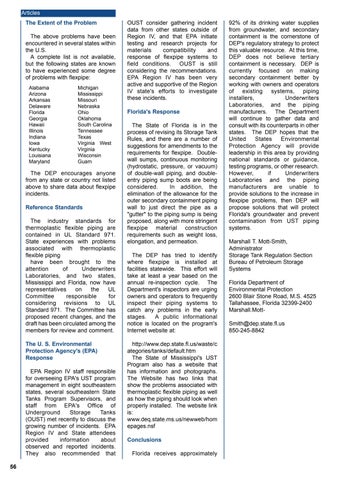Articles The Extent of the Problem The above problems have been encountered in several states within the U.S. A complete list is not available, but the following states are known to have experienced some degree of problems with flexpipe: Alabama Arizona Arkansas Delaware Florida Georgia Hawaii Illinois Indiana Iowa Kentucky Louisiana Maryland
Michigan Mississippi Missouri Nebraska Ohio Oklahoma South Carolina Tennessee Texas Virginia West Virginia Wisconsin Guam
The DEP encourages anyone from any state or country not listed above to share data about flexpipe incidents. Reference Standards The industry standards for thermoplastic flexible piping are contained in UL Standard 971. State experiences with problems associated with thermoplastic flexible piping have been brought to the attention of Underwriters Laboratories, and two states, Mississippi and Florida, now have representatives on the UL Committee responsible for considering revisions to UL Standard 971. The Committee has proposed recent changes, and the draft has been circulated among the members for review and comment. The U. S. Environmental Protection Agency's (EPA) Response EPA Region IV staff responsible for overseeing EPA's UST program management in eight southeastern states, several southeastern State Tanks Program Supervisors, and staff from EPA's Office of Underground Storage Tanks (OUST) met recently to discuss the growing number of incidents. EPA Region IV and State attendees provided information about observed and reported incidents. They also recommended that 56
OUST consider gathering incident data from other states outside of Region IV, and that EPA initiate testing and research projects for materials compatibility and response of flexpipe systems to field conditions. OUST is still considering the recommendations. EPA Region IV has been very active and supportive of the Region IV state's efforts to investigate these incidents. Florida's Response The State of Florida is in the process of revising its Storage Tank Rules, and there are a number of suggestions for amendments to the requirements for flexpipe. Doublewall sumps, continuous monitoring (hydrostatic, pressure, or vacuum) of double-wall piping, and doubleentry piping sump boots are being considered. In addition, the elimination of the allowance for the outer secondary containment piping wall to just direct the pipe as a "gutter" to the piping sump is being proposed, along with more stringent flexpipe material construction requirements such as weight loss, elongation, and permeation. The DEP has tried to identify where flexpipe is installed at facilities statewide. This effort will take at least a year based on the annual re-inspection cycle. The Department's inspectors are urging owners and operators to frequently inspect their piping systems to catch any problems in the early stages. A public informational notice is located on the program's Internet website at: http://www.dep.state.fl.us/waste/c ategories/tanks/default.htm The State of Mississippi's UST Program also has a website that has information and photographs. The Website has two links that show the problems associated with thermoplastic flexible piping as well as how the piping should look when properly installed. The website link is: www.deq.state.ms.us/newweb/hom epages.nsf Conclusions Florida receives approximately
92% of its drinking water supplies from groundwater, and secondary containment is the cornerstone of DEP's regulatory strategy to protect this valuable resource. At this time, DEP does not believe tertiary containment is necessary. DEP is currently focused on making secondary containment better by working with owners and operators of existing systems, piping installers, Underwriters Laboratories, and the piping manufacturers. The Department will continue to gather data and consult with its counterparts in other states. The DEP hopes that the United States Environmental Protection Agency will provide leadership in this area by providing national standards or guidance, testing programs, or other research. However, if Underwriters Laboratories and the piping manufacturers are unable to provide solutions to the increase in flexpipe problems, then DEP will propose solutions that will protect Florida's groundwater and prevent contamination from UST piping systems. Marshall T. Mott-Smith, Administrator Storage Tank Regulation Section Bureau of Petroleum Storage Systems Florida Department of Environmental Protection 2600 Blair Stone Road, M.S. 4525 Tallahassee, Florida 32399-2400 Marshall.MottSmith@dep.state.fl.us 850-245-8842
